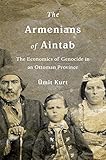The Armenians of Aintab : the economics of genocide in an Ottoman province / Ümit Kurt.
Material type: TextPublisher: Cambridge, Massachusetts : Harvard University Press, 2021Description: pages cmContent type: text Media type: unmediated Carrier type: volumeISBN: 9780674247949Subject(s): Armenians -- Turkey -- Gaziantep -- History | Armenian massacres, 1894-1896 | Abandonment of property -- Turkey -- Gaziantep | Deportation -- Turkey -- Gaziantep -- Citizen participation | Gaziantep (Turkey) -- Economic conditions | Gaziantep (Turkey) -- Politics and governmentDDC classification: 956.6/20154 LOC classification: DR435.A7 | K873 2021
TextPublisher: Cambridge, Massachusetts : Harvard University Press, 2021Description: pages cmContent type: text Media type: unmediated Carrier type: volumeISBN: 9780674247949Subject(s): Armenians -- Turkey -- Gaziantep -- History | Armenian massacres, 1894-1896 | Abandonment of property -- Turkey -- Gaziantep | Deportation -- Turkey -- Gaziantep -- Citizen participation | Gaziantep (Turkey) -- Economic conditions | Gaziantep (Turkey) -- Politics and governmentDDC classification: 956.6/20154 LOC classification: DR435.A7 | K873 2021| Item type | Current library | Call number | Status | Date due | Barcode |
|---|---|---|---|---|---|
 Books
Books
|
The BIAA David H. French Library Shelf 62 - Reading Room | H2n KURT 32565 | Not for loan | BOOKS-000000025442 |
Includes bibliographical references and index.
The 1895 massacres in Aintab -- Ethnic politics after the Young Turk Revolution -- Wartime deportation and destruction of the Aintab Armenians -- Confiscation and plunder under the Abandoned Property Laws -- The flawed restitution process for Armenians -- The end of the Armenian community in Aintab.
"Ümit Kurt explores causes and effects of the Armenian genocide in his hometown of Gaziantep, Turkey. He finds that local gentry and ordinary Turks were heavily motivated by the prospect of financial gain as Armenians were dispossessed. Newly enriched Turks then financed the young republic, elevating themselves to the status of a political elite"-- Provided by publisher.
